
All images courtesy of McGhee Management
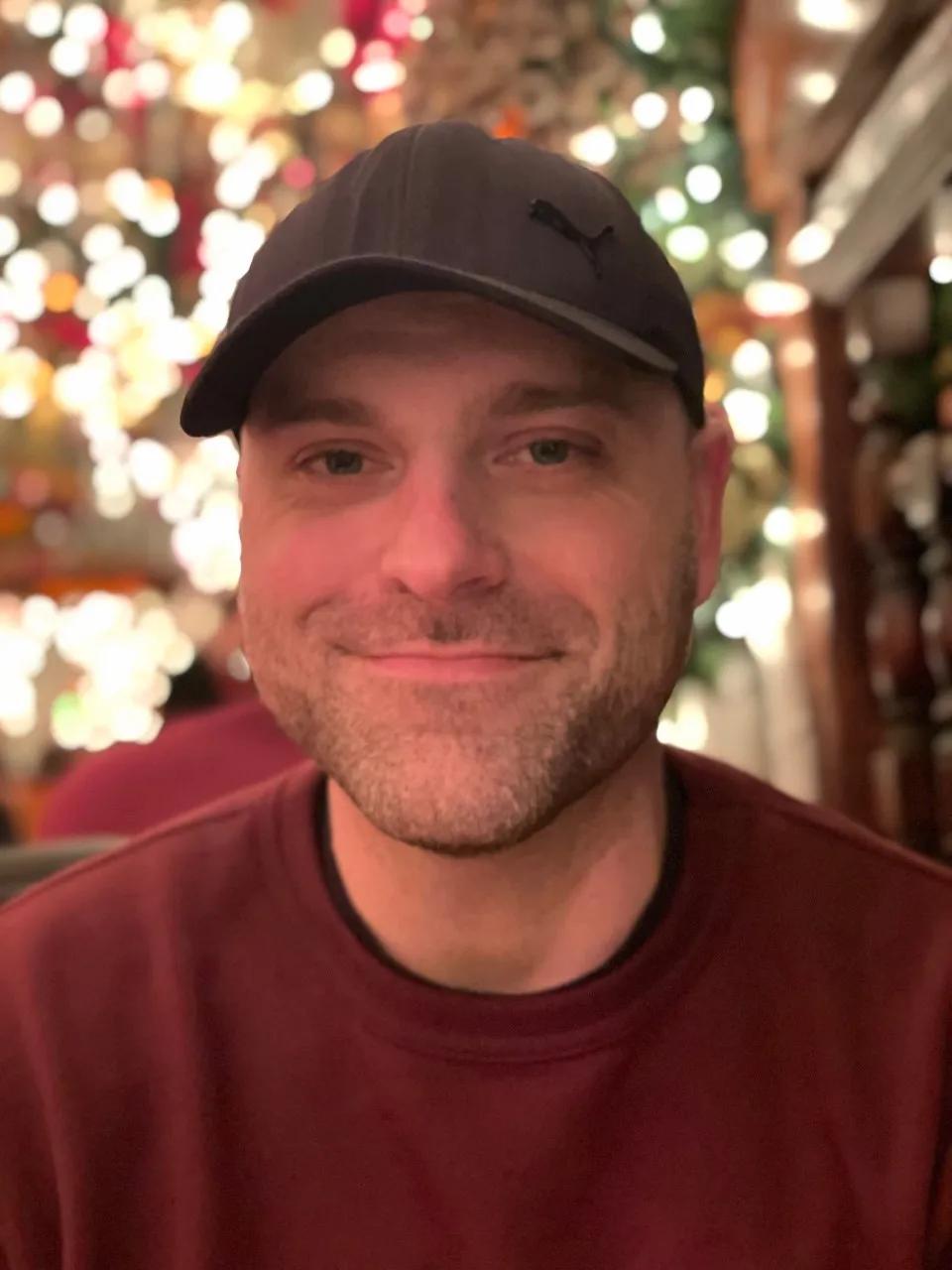
By Andrew Daly
[email protected]
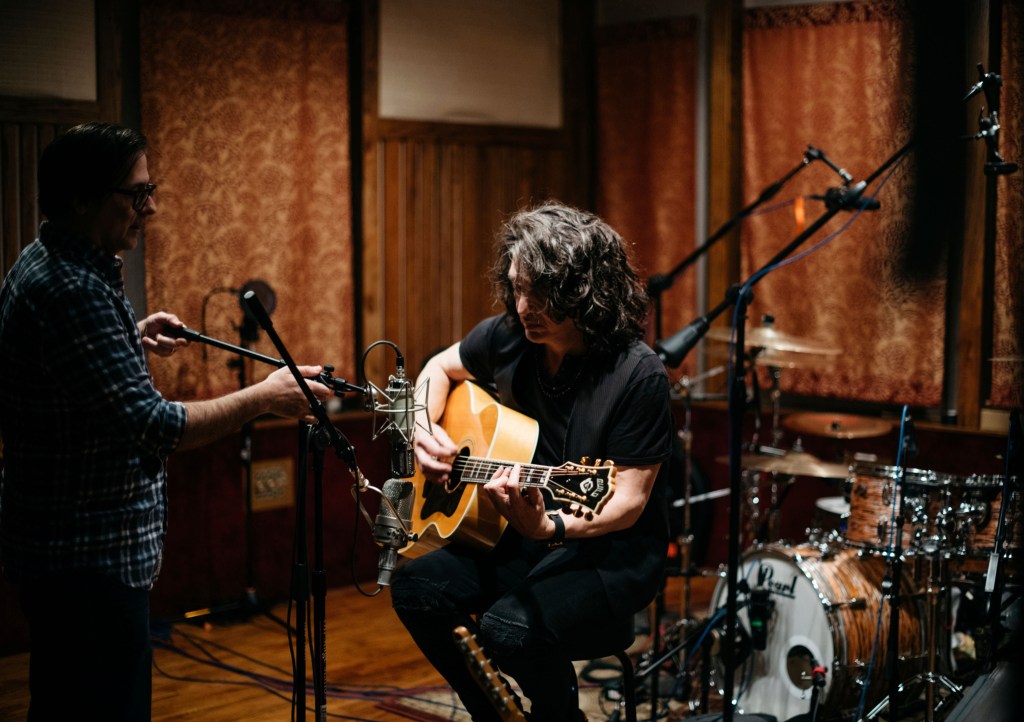
When it comes to music, there’s really nothing like soul. Think about it; when you listen back to those old Motown, Stax, Volt, and Atlantic records, you can’t help but just feel the joy that radiates off of them, right?
Paul Stanley would almost certainly agree. While most of you know Paul as the frontman, and rhythm guitarist of hard rock band, KISS, if you were to dig deeper into not only his music but his story, you would find that his roots aren’t so much Zeppelin and Sabbath as they are Otis Redding and Solomon Burke.
With all that being said, we all know that the world today could use a little cheer, and the good news is that Paul Stanley has just what the doctor ordered with Now And Then, the new record by you guessed it – Paul Stanley’s Soul Station.
Backing him up, Paul has a smokin’ hot band, loaded with talented musicians top to bottom. Just look at it – aside from Paul, you’ve got Eric Singer, Crystal Starr, Sean Hurley, Alex Alessandroni, John Pappenbrook, and many more.
If you would like to learn more about the band, you can head over to Paul’s website here. If you would like to order a copy of Now And Then, head here. And of course, if you would like to learn more about KISS, head here.
I recently sat down with Paul Stanley, where among other things, we touch on KISS‘ latest trip to Dubai for New Year’s Eve, his lifelong love for early Philly soul, putting together his Soul Station band, overcoming other people’s expectations of him as both a singer and artist and much more.
Andrew:
Hi Paul. Happy to have you here. This is a real treat.
Paul:
Thank you.
Andrew:
So, how are you making out through all of this so far?
Paul:
You know, it’s horrific, and for me, it’s been an inconvenience, and for other people, it’s been devastating. So certainly the past few months were, I think, horrible in that we had no idea what we were dealing with. So, basically, it was sheltering in place. But I think that now if we’re smart, we can weather the storm to the end. Hopefully, there is light at the end of the tunnel. It’s just a matter of people being smart and unfortunately, sometimes, for whatever reason, they choose not to be.
Andrew:
That’s the unexplained part of it. But, you know, all we can do is try to do the right thing. And hopefully, we don’t come out of this on the short end of the stick. Anyway, you guys [KISS] just got back from Dubai about a month ago. I watched the show and it was pretty amazing. How was it for you guys?
Paul:
It was pretty incredible. I have to say, I’ve seen us blow a lot of stuff up, but I’ve never seen anything like that! I have to say that we rehearsed just a few of the effects earlier the evening before…the flames and the flamethrowers…I’ve never felt anything that hot in my life! It was sincerely like opening the door to a furnace. I lost a little bit of sleep thinking, “Am I going to do this again?” So between that and everything else, it was interesting certainly to be playing for such a small, distant crowd. And then basically the hotel had sold all the rooms, basically like a concert venue.
So, it was odd in some ways, but it was something that was really surreal. OK, we’re in the midst of this pandemic and we were basically quarantined. We were being tested, if not daily, every other day. The crew was tested daily. So, it was pretty crazy. And the fireworks at the end of the show were just incredible. I mean, it was awesome. The crazy thing was, that the entire fireworks show was basically finale after the finale of over-the-top fireworks shows, and that was insane. It was absolutely insane.
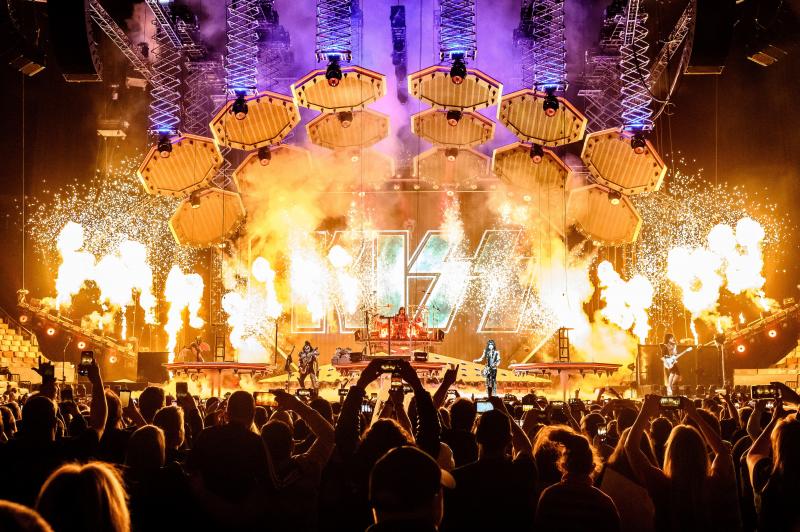
Andrew:
You know, even if we weren’t in the middle of a pandemic, I would be been watching this show. What better way to spend New Year’s Eve than with KISS? [Laughs].
Paul:
You know, subtlety is not our style. [Laughs].
Andrew:
No, my first ever concert was KISS, in 2000. And then I saw you guys again in 2015. We had floor seats. I took my cousin, and you were talking about the heat…I felt that heat from the pyro at that show. And I think it was a small town outside of Boston, but I can only imagine the heat that you guys must have felt in Dubai.
Paul:
That’s it. You know, I feel that heat every night that you as an audience member feel. But this was nothing like that. It was terrifying. Next level.
Andrew:
Well, it was definitely pretty awesome. I know that you guys broke a Guinness Book World Record during the show, but other ones were sort of in flux. Did you end up breaking all the ones you set out to break?
Paul:
I have to find out. I mean, to me, it was mission accomplished. We did the show, so I haven’t really followed up on it since then. I’ve been more than knee-deep…neck deep…in Soul Station. To be continued there.
Andrew:
So, when I first heard that you were doing a Soul record, I think my friend said, “That’s interesting, but Paul’s a rock guy.” But to me, it kind of made sense in a way, because even with the first KISS album, there was a lot of swing on that record. With songs like “Let Me Know” and even “Strutter,” those could have been R&B songs. And with your ’78 solo record, you’ve got “Move on,” which has an R&B tinge to it, and “Hold Me, Touch Me,” too. So, it sort of feels like you’ve always had a Soul and R&B side hidden deep inside of you all these years.
Paul:
It was very funny because I’m thinking before I ever saw Zeppelin or any of those bands that were so important to me, I saw Otis Redding; I saw Otis when I was, I think, about 15. I saw Solomon Burke. I saw the Temptations. That really was the basis and the foundation of my music. I built on that. But that’s where it started. And if you listen to “Shout It Out Loud”…“Well, the night’s begun and you want some fun, do you think you’re gonna find it, think you’re gonna find it”… that’s The Four Tops. If you listen, there’s a song on Unmasked called “What Makes The World Go ‘Round;” we didn’t do it the exact way it was written but it’s a Spinner’s song, you know? So those are my roots. I was laughing because I was with Rod Stewart probably eight months ago. After all, we lived near each other and I was saying, “Yeah, you know, I got my Philly Soul Motown band.” And he goes, “Yeah?” He goes, “Who sings?” And I went, “Me.” And he goes, “You can handle those songs?” So, he heard it and kept talking about it for the next couple of days!
I understand on first blush somebody might go, “Well, that’s either weird or it’s going to suck” and I get it, but I really didn’t do it to convince or to change anybody’s mind. I did it because I love that music, and I don’t think that enough people hear it nowadays. I think that it’s been relegated to being samples in Rap tunes and I think there’s a need for it, and everybody who’s in Soul Station has their pedigrees and is impeccable. They’ve either played with The Temptations, Smokey, Stevie, Natalie Cole, or Whitney Houston. It’s just an amazing band and all everybody wants to do is these songs and to play this music. And it’s not that we’re not imitating, this isn’t like Rich Little, imitating somebody. This is passion. And I think what we captured was the spirit and the emotion behind the songs as opposed to note for note, but it’s damn, damn close because I think that was also important, but I didn’t want us as individuals to get lost. But that said, I really think that it’s got a real force to it.
Andrew:
I’m not surprised that you took on Soul music. You’re a singer. I mean, you did Phantom of the Opera. Was that twenty-two or twenty-three years ago? And you’ve always had a lot of range as a singer. I mean, I always thought you could handle anything you want. But I think one of the things I really noticed about Soul Station is, at first, I knew that you guys were doing some covers…I thought it was great that you tackled Al Green and some lesser-known people, but with Al Green…that’s an undertaking in and of itself.
Paul:
Those are big shadows.
Andrew:
It’s interesting because you’ve got a pretty big shadow yourself. You’ve written a lot of great songs. I mean, you’ve been doing it for 45 plus years. You go through the decades, you’ve written dozens of songs that stand the test of time. So, for me, you’re not necessarily filling a shadow; it’s almost like your shadow is walking alongside their shadow. And that’s what I like about this record; it’s not as if you’re “not imitating;” it’s almost as if you’re translating it for a new generation.
Paul:
Yeah, that’s really how I feel about it, too. I’m not Al Green. I’m not David Ruffin or Eddie Kendricks or Russell Thompkins or any of those people. I mean, I understand that music very, very well because it was pivotal for me. So, it’s always fascinating to me when somebody says, “Well, are you trying to reinvent yourself?” And I go, I’m a singer. I’m a Rock singer. Only because I choose to be; I’m a singer of Rock, but that’s a choice. I’m a singer. When I did Phantom of the Opera, why not? I understand that some people will go, “No, no, no, no, just stay in your lane.” And I’m like, I’m not interested in staying in my lane. I don’t do that on the freeway either. I want to go where I want to go. It’s your choice whether or not to embrace it, and it’s my choice to do it.
Andrew:
If you’d stayed in your lane, you wouldn’t have gotten as far as you’ve got now. You’ve gotten as far as you have by taking chances, right? I mean, in the case of Phantom of the Opera, in the KISS stage show, and even in this, everything’s about chances. But I think this record is interesting because, when I was looking at the band you put together, I didn’t realize Eric Singer was playing drums on this until I actually dug into it. And that’s probably a choice where everybody would’ve been like, “Wow, you know, he’s worked with Alice Cooper. He’s worked with Black Sabbath. He’s a “Rock guy,'” but he’s a pretty versatile drummer and he keeps excellent time. I mean, when it comes to Soul music if you’ve got a good, solid backbeat, and you can keep time, that’s really what it comes down to.
Paul:
With Eric, it would have been ridiculous if we just said, “Hey, let’s go get so-and-so. This Metal drummer or this Hard Rock drummer.” Eric’s played in big bands with his dad and the depth of what he’s capable of doing is amazing. And he’s a great singer, so he even gets to sing some on the album.
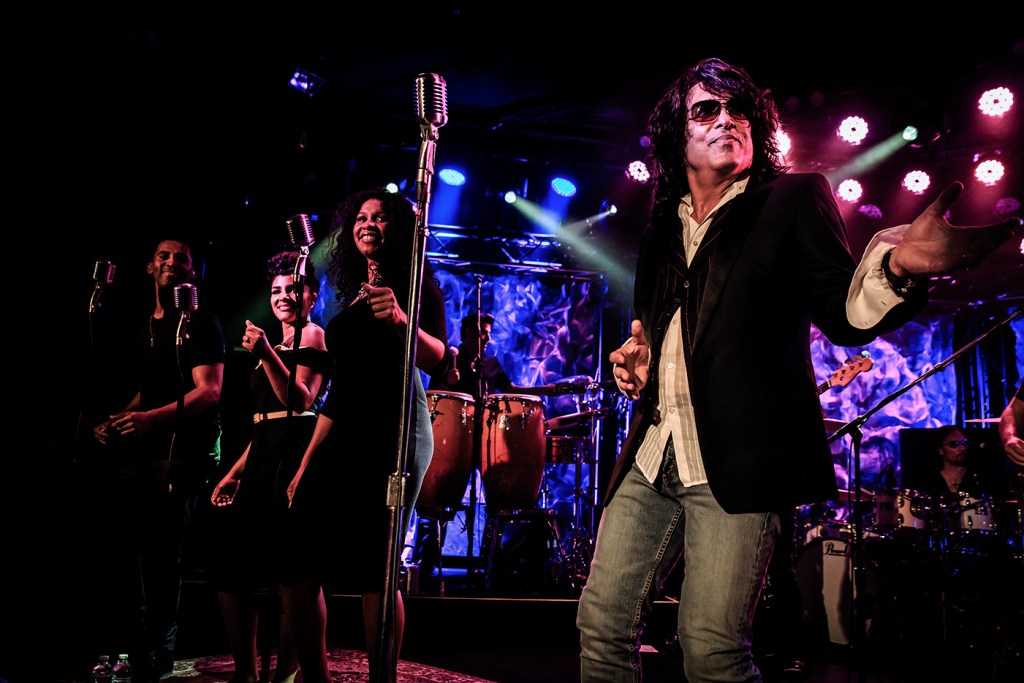
Andrew:
He really is a good singer and like I said, very versatile. How about the rest of the band? How did it all come together? You’ve got some really talented people here. Looking at it, there’s Crystal Starr and Gavin Rhone…
Paul:
Well, you know, it’s humbling for me. It really was just that the planets just lined up. There were no auditions or anything; it’s crazy because most of these people have never played together and it’s really like a family. Everybody comes over to my house; we love hanging out. If you watch the videos, you see the band’s just having a ball early on. It started with Eric and I and Rafael, the guitar player who’s played on that Rock star TV show. I don’t know, maybe that was eight or nine years ago. He has also played with Pink. He’s a phenomenal player. So, he was in the original version of the band, as was Crystal. And from there, I would start saying, “Hey, do you know anybody who, you know, might be able to do this or that?” Actually, Sean Hurley, bass player, who really plays phenomenally, very much in the realm of James Jamerson, who played on most of the big Motown songs, he played on a couple of tracks on Live to Win, my second solo album. And I just called Sean because he had been out with John Mayer, and I said, “Are you interested in, you know, this music?” He said, “Are you kidding? That’s what I love doing.” So, Sean came on board, and somehow the percussionist Ray Yslas, who’s played with everybody, joined the sessions, and this past year, he was out on tour with Chicago, playing for them.
Then at some point, we needed a musical director. I certainly have my hands in all of that, but I like to have somebody who really has the technical know-how to interpret either what I’m saying or put it across to the band. So, Alex Alessandroni, who’s our musical director, was musical director for Natalie Cole, for Whitney Houston, for Christina Aguilera, and Pink. Our lead trumpet player [Jon Papenbrook] has played with everybody but also goes back to having played with Sinatra and Buddy Rich. So, it’s a really amazing group of people and it just fell together. It’s the weirdest thing. It really was. It wasn’t, oh, we’ll take this person because we can’t get this person. It just fell together and we just have a ball.
Andrew:
It really shows that you guys truly enjoy playing together. And that exuberance comes through in the music. It comes through in those videos. There’s a certain quality about this record that’s really genuine and it just really heightens the appeal. I was thinking when I was watching some of the studio footage, I know it’s been a while since you put out a studio record. I think the last one was 2012’s Monster with KISS, and solo was Live to Win, in 2006. So, how did it feel getting back in the studio, but this time sort of in a totally different setting than what you’re used to?
Paul:
It’s a totally different setting with this big band and a wall of sound, a totally different atmosphere; glorious to hear that music and be in the center of it, and arranging it was incredible. I would go into the studio, even though there were times when I was sick or when we did one of my tracks, I could barely sing, but we got the vocal arrangements. We got all the parts and it was just so much fun. I mean, to hear something in your head and then hear it actually come back is mind-boggling, and then to be in the center of it is crazy. It’s just awesome.
Andrew:
Another interesting thing about this is the timing. As you probably know, there is this little bit of a mini, old-school Soul revival happening right now. You’ve got artists like Kelly Finnegan, Delvon Lamarr, Durand Jones…artists that if you didn’t know any better, you would think are straight out of the mid or late 60s. So, you’ve had this love of Soul your whole life, but did the timing of the revival have anything to do with you putting it out, or was it just totally coincidental?
Paul:
Totally coincidental. Again, maybe the planets lined up. I think that there’s so much that has been missing, and maybe that developed from certain routes but went so far away from it, that I think there are people out there who are just going to want to get closer to their roots and to be there, to be who I am, and to walk alongside it, is awesome.
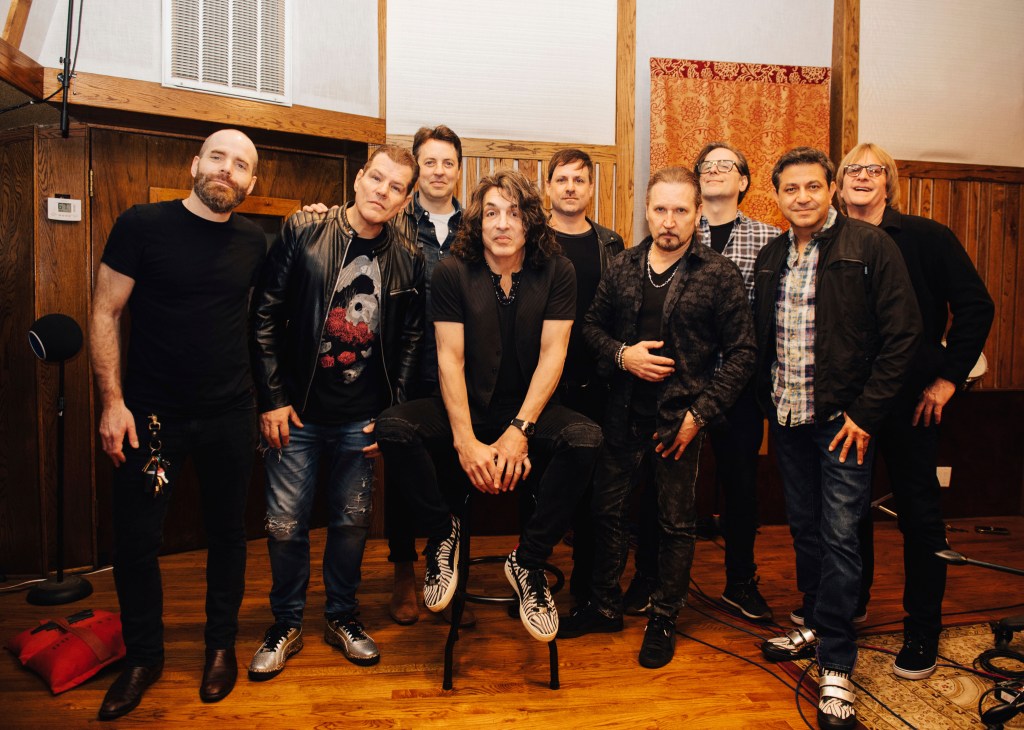
Andrew:
You mentioned before that you wrote some new tracks for the album, which was a really pleasant surprise. They’re so seamless alongside the covers. I was listening to it, and I had to go back and kind of figure out which ones were your tracks. You really did a good job of blending them in. So, you’ve written a lot of songs in your career, obviously more in the canon of rock and you’ve done ballads and things like that. How did it compare writing for this genre, in this vein, compared to when you write for Rock and Metal?
Paul:
I know this music. I know it. I know it like the back of my hand. I know what makes the orchestrations tick. It wasn’t calculated. It’s not mimicry. It’s not like when we try to copy these kinds of songs. It’s just I love that music and “seamless” is a word that’s come up time and time again. When we were in the midst of the KISS tour and Lenny Kravitz came backstage, he was in my dressing room and I said, “Let me play you some of the most recent Soul Station stuff,” and he was just like, “I don’t know which is which,” it’s just…it’s seamless.
Another big singer/songwriter said to me, “You know, my favorite track on the album is ‘Lorelai’ and I don’t remember where that one came from,” and I said, “What do you mean?” He goes, “Well, who did it originally?” I went, “I wrote it!” So, that’s what I wanted. I didn’t want to reinvent the wheel; I just wanted to grease it up and make sure that it was running well. So, all the new songs are not “new” in the sense that you hear them and go, “Oh that’s an updated version of whatever.” It all lives in the same house.
Andrew:
So, with KISS, you’ve recorded, I think, twenty studio albums in your career. You’ve done your two solo records, bunches of live albums, so when you look back on it, or I guess now that this album is in the can and it’s about to come out soon, where is this going to sit in the Paul Stanley canon? How will it be compared to everything else you’ve done? How do you look at it in the scope of what you’ve accomplished so far?
Paul:
Well, I couldn’t have done it in the past. It had to be now. It had to be at this point in my career and it means as much to me in a different way as my first solo album, because it really is so much of a reflection of who I am and what I believe is good. And it’s KISS that’s made everything possible.
So, as a personal statement, it’s really important to me right up there with my first solo album. It feels very, very much a reflection of who I am now. Someone else might go, “Wow, you know, I don’t want to hear this. I just want to hear Rock.” And I go, well, no, that’s great but I can’t please anybody unless I’m pleasing myself, and I’ve got to give myself that leeway. And I’m not the first singer, lead singer, call it what you will, who’s gone off and done something out of what one might expect, but that’s part of what makes me or makes us what we are. I can’t live within the boundaries that other people will set for me; I need to be free, to do whatever I want, and everyone is free to either acknowledge and embrace it or not. If you’re going to make art, you have to do it for yourself first; everything else will fall in line after that.
Andrew:
The album comes out this March. Obviously, COVID has halted everything and you’ve got a KISS tour to finish. Are you going to tour with Soul Station too?
Paul:
I’m hoping to go out with Soul Station before the KISS tour resumes because getting the End of the Road Tour up and running was a monumental, massive amount of work and technical work in getting all the pieces running. So, to do that again is going to take some time. Right now, nobody has any idea when we’re really going to see mass concerts allowed again. So, in that interim period, and I believe there will be a real sort of downtime, I want to get out there with Soul Station.
Andrew:
And as far as The End of the Road Tour goes, I can’t imagine a world without KISS. I can’t wrap my head around that just yet. So, for me, the only good thing about COVID is that the proverbial road toward the end just got a little bit longer. [Laughs]. But I guess we’re not going to lose any shows on that tour, right? They will just get pushed back?
Paul:
Sure. The tour is being pushed back, has been pushed back, and it’ll resume and it’ll carry on. You know, there’s a saying, “Man makes plans, God laughs.” Or they say that life is what happens while you’re busy making plans. So, nobody could have foreseen this, but things get adapted and changed because of it.
Andrew:
Well, when Soul Station comes to New York, I plan to be there and when KISS comes back to New York, I’ll plan to be there as well. Thank you so much for your time, Paul. Best of luck with Soul Station. Stay safe and be well.
Paul:
I’ll see you both places! Thank you and you too.
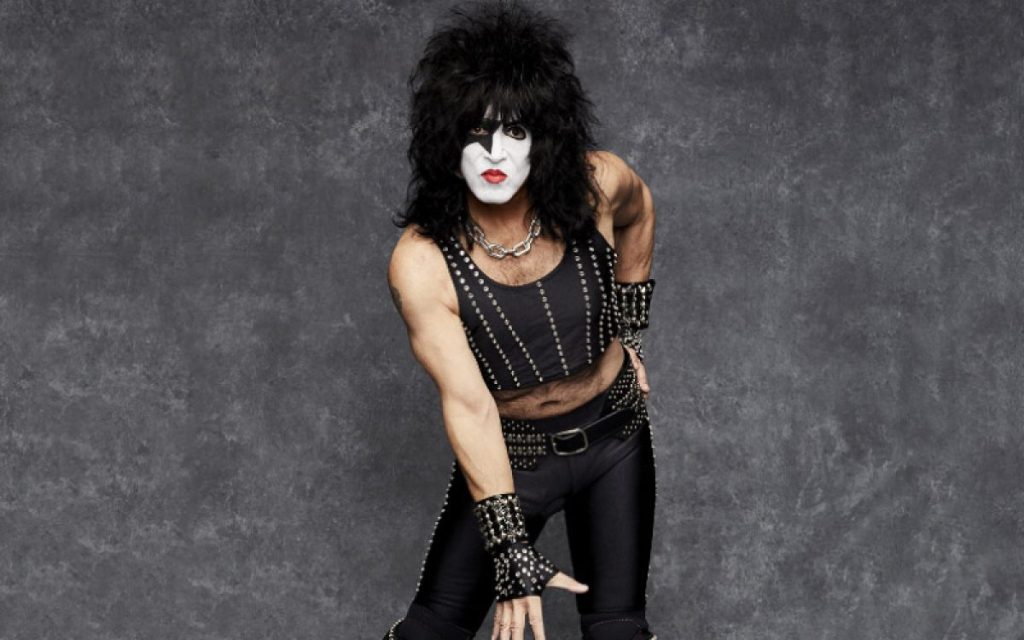
Interested in learning more about the work of Paul Stanley? Check out the link below:
Be sure to check out the full archives of Vinyl Writer Interviews, by Andrew Daly, here: www.vwmusicrocks.com/interview

One thought on “An Interview with Paul Stanley of KISS”